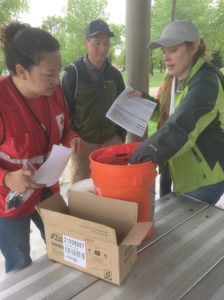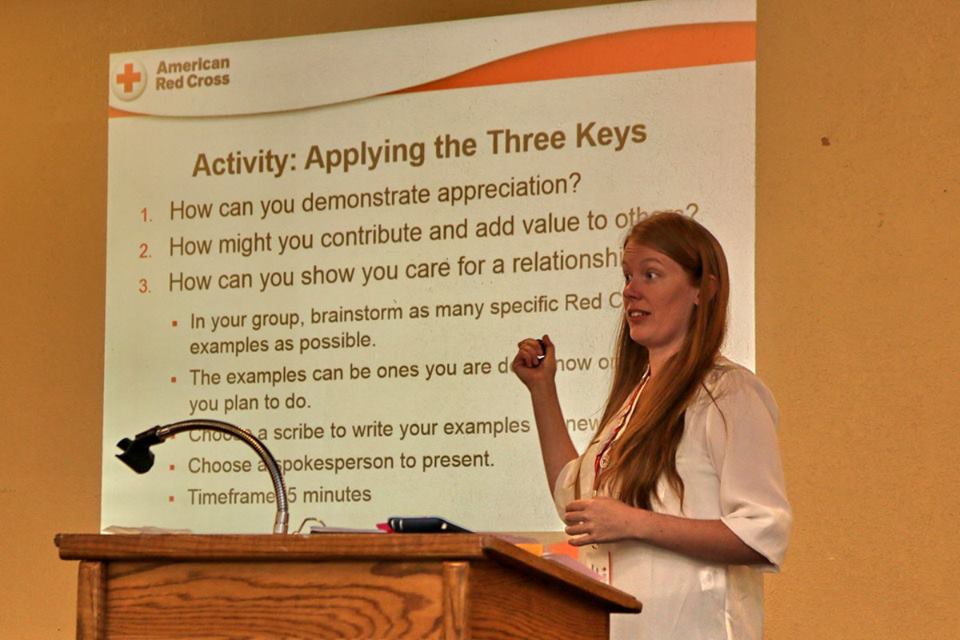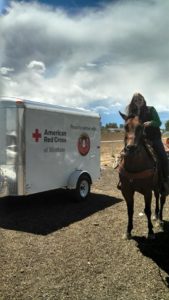This Native American Heritage Month, we’re highlighting those who play a pivotal role in helping the American Red Cross accomplish its humanitarian mission every day in tribal communities across the country. This week, we’d like to highlight Abbra Firman, the Red Cross Disaster Program Manager for Eastern Montana. Here is a conversation we had with her around Native American Heritage Month and our work with tribal communities.
What is your role at the Red Cross?
I am a Disaster Program Manager for Eastern Montana. In this role, I oversee the Disaster Program in 27 counties and five reservations serving seven tribal nations. My territory covers urban to frontier counties over roughly 74,000 sq. miles. To put that in perspective, the territory I oversee is larger than the whole state of Florida. I rely on strong partnerships with agencies and emergency managers as well as relationships with our tribal nations to help us serve those in need. I could not do my job if it were not for the dedicated volunteers and partners in Eastern Montana.
In your role, how do you work with the Native American Community?
I mostly work with the emergency managers on each of the reservations. In areas where there is a transition or no emergency manager, I try to find community contacts. Montana has 13 tribal nations, 12 of which are federally recognized and have land. It is my goal to make sure every Montanan knows of and has access to Red Cross services.
The most important part of my work involves introducing partner agencies to tribal nations. I sit on the Montana Indian Nations Working Group (MINWIG), a coalition of emergency managers and public health staff from each of the reservations. Through this organization I have had the honor of working with my peers and the tribal nations of Montana. This work has helped me learn so much about the cultural similarities and differences of the tribes.
Every nation is different and the more time, conversations and trainings we have together, the stronger our relationships become.
In your experience, what are some of the challenges that Native Americans face during disasters?
 My experience has shown me that each nation has its own unique challenges, but one of the biggest challenges lies in whether or not a tribe is recognized by the government. Montana has the Little Shell Chippewa Tribe, which the state recognizes, but it is not yet federally recognized. This tribe is also landless meaning they do not have a state recognized reservation, nor do they have the ability to work directly with a federal agency like FEMA on behalf of the tribe’s members in a disaster. The Little Shell Chippewa Tribe shares the status of many nations across the country where they exist but are not recognized.
My experience has shown me that each nation has its own unique challenges, but one of the biggest challenges lies in whether or not a tribe is recognized by the government. Montana has the Little Shell Chippewa Tribe, which the state recognizes, but it is not yet federally recognized. This tribe is also landless meaning they do not have a state recognized reservation, nor do they have the ability to work directly with a federal agency like FEMA on behalf of the tribe’s members in a disaster. The Little Shell Chippewa Tribe shares the status of many nations across the country where they exist but are not recognized.
Socioeconomic status is another challenge faced by many tribes in the wake of a disaster. The sad and harsh reality is that many of our tribal nations struggle with poverty and disasters only make those struggles more significant. In Montana, there might be one or two general stores on a reservation, and if these stores are under water because of a flood, the nearest town is a hundred miles away. That store being closed also means those who worked there don’t have jobs as they try to recover, and more gas money is needed to get groceries.
Also, economically fragile communities often lack diverse partner resources. There might not be a thrift store, a food bank, a Salvation Army office or another organization that the Red Cross can partner with to aid our clients. This doesn’t mean the partner agencies won’t help, but it does make it that much more vital for the Red Cross to have these relationships. We can share with our partners the needs that are unmet and connect that tribal community with resources it might not have on a daily basis, things that become essential in a post disaster situation.
What is one of your most memorable experiences from working with the tribes in your region?
I would say one of the most memorable experiences I have had was getting to participate in the signing of the Memorandum of Understanding between the Crow Nation and the American Red Cross. It was the third in the country, and the first in Montana. Two months after the private signing, the Red Cross was asked to come to the Crow Fair. And in front of a bandstand full of people, Chairman Darrin Old Coyote and the Chief Executive Officer of the Montana Red Cross Chapter, Rodney Kopp, signed ceremonial copies. Red Cross also delivered a co-branded shelter trailer, which will help us with sheltering during disasters. I had the opportunity to spend the day with the emergency manager, the deputy emergency manager, a volunteer and a large group of the Crow people. The emergency manager learned it had been a solid five years since I had been on horseback and decided to change that. It was a day where I made friends for a lifetime, and I am so thankful to have had the opportunity to go and participate in the signing and attend the Crow Fair that year.
What are a few things that you’ve learned while working with these tribes?
I learned no two nations are the same. I have been working with Montana tribal nations for five years, and I’m still learning the subtle nuances of each tribe. I enjoy learning from them and becoming more knowledgeable so that Red Cross can be a better partner with them in disasters.


